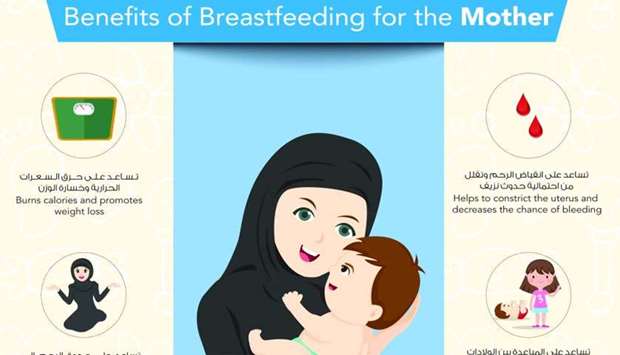The Ministry of Public Health and healthsector institutions are seeking to raise breastfeeding rates in Qatar to reflect those set by the World Health Organisation (WHO).
Statistics from the Ministry of Public Health revealed that 18.6% of Qatari children and 36% of non-Qatari children exclusively breastfeed during the first six months of life.
The ministry said in a statement on the world breastfeeding week (the first week of August) that this rate is way below the target set by the WHO for exclusive breastfeeding during the first six months of life, a minimum of 50% by 2025.
The Ministry confirmed that it is working in co-operation with various health sector institutions to implement practices that protect and promote breastfeeding, pointing out that the National Health Strategy 2018-2022 has paid great attention to this aspect.
It has set a national target of 15% in exclusive breastfeeding for the first six months of life.
In co-operation with health sector institutions, the Ministry is intensifying awareness about breastfeeding.
It prepared educational materials to demonstrate the various health benefits of breastfeeding in the short and long term for both mother and infant and distributed these materials in various health institutions.
Breast milk is the first natural food the baby takes, provides it with all the energy and nutritional needs in the first six months of its life.
Breast milk continues to cover most of the infant's nutritional needs until the second year.
The ministry has launched the Baby Friendly Hospital Initiative in 2016, which aims to implement practices that protect and promote breastfeeding.


It is being implemented in all hospitals and primary healthcare centres.
WHO and the United Nations Children's Fund (Unicef) confirm that breastfeeding contributes to reducing child mortality rates.
Breast milk contributes to sensory and cognitive development of the infant and reduces obesity and noncommunicable diseases such as diabetes, cardiovascular disease, high blood pressure, and some cancers.
WHO recommends exclusive breastfeeding in the first six months of the infant's life and then continues with adequate supplemental food until the child reaches two years of age.
Breastfeeding is providing optimal nutrition and reducing the risk of disease later.


It also contributes to enhancing maternal health and reducing the risk of ovarian cancer or breast cancer.
It also helps women regain their normal weight faster, and contribute to the formation of strong mother-child bonds, which reduces the risk of postpartum depression and is a safe and economical means of nutrition.

